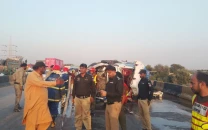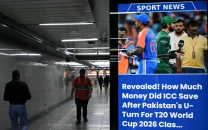Speak softly and carry a stun gun
A growing number of women have expressed interest in buying lethal, non-lethal weapons to better defend themselves.

“And this was when pillion riding had been banned in Karachi,” says Rasti. “One of the men got off the motorcycle, reached under his shalwar kameez and pulled out a gun. Instinctively, before he could aim it at me, I stepped on the accelerator and rammed into him, pushing him against his companion and startling them both.” Rasti then backed out of the alley and zoomed away, stopping only to tell policemen stationed nearby about the incident. “The police weren’t bothered,” says Rasti. “It was as though I was telling them mildly interesting gossip.”
Rasti was lucky. A combination of quick thinking and skill allowed her to escape from her situation unscathed. But other women in Karachi might not be as lucky, especially since crime is on the rise in Pakistan’s largest metropolis.
According to official figures released by the Sindh Police, there have been five times as many incidents of gang rape in the Karachi region during the period January 1, 2010 to September 30, 2010 as there had been the previous year. Incidences of kidnapping, abduction and theft also increased during the same period.
Chief of the Citizen’s Police Liaison Committee (CPLC), Ahmed Chinoy, agrees that crime and insecurity in Karachi have spiked in the past two years. “From 2009 to 2010 alone, crime in Karachi has increased by about twenty per cent,” says Chinoy. “This is very worrying because expenditures on the police force also increased over the same period.”
Girls, guns, and nerves of steel
Karachi has not been safe for many years, but after two women were abducted on December 19, 2010 in Defence and one of them was assaulted and gang raped, women in Defence and Clifton have been hesitant to move around freely. “My parents have suggested that I refrain from driving myself around after dark,” says Madiha, a twenty-four year old banker and resident of Defence. “We used to think Clifton and Defence were slightly safer than other parts of the city. Now we’re not so sure anymore.”
This is not the first time a rape case in Defence has made waves in the media — the memory of the infamous ‘white Corolla’ gang that struck fear into the hearts of Karachi residents over a year ago is still fresh in people’s minds, though officials are quick to dismiss any connection between the two cases.
“The gang rape that just took place in Defence this December was an isolated incident, and I can say that with confidence,” says the CPLC chief. “We have no knowledge of other such incidents occurring in Defence and Clifton. Yes, there was valid concern with the white Corolla case, but we launched a huge operation to counter that and eventually, last year we caught them.”
Women on the streets, however, are not convinced. Zahid Motiwalla, who runs an arms shop located in Zamzama, says a growing number of women have expressed interest in buying lethal and non-lethal weapons in order to better defend themselves. Chinoy also acknowledges the authorities are receiving more requests for arms licenses now than in previous years.
“Some people want to buy weapons for their security personnel, which means they want shotguns, and people who want to carry weapons for their own protection buy small-caliber weapons like pistols,” Motiwalla says.
“We definitely had more women coming to us after this incident in Defence,” he says. Motiwalla goes on to say that he recommends that all women carry a non-lethal weapon on their person when they move around the city. Pepper spray, stun guns and tasers fall into the category of non-lethal weapons, deterrents that are meant to temporarily incapacitate an attacker.
According to Motiwalla, a taser provides the best defense as it can be used against an attacker from a distance of up to fifteen feet. Pepper spray and stun guns have limited range. “However, tasers are expensive and are not easily available in Pakistan,” says Motiwalla. “In the US, tasers cost around Rs 34,000 or more, and in Pakistan they can cost up to Rs 50,000. Of course, women who can afford this do pay — they obviously think it’s worth it.”
Tara Mahmood, a television executive, says she recently started carrying a nightstick to protect herself, but would have preferred a taser. “I couldn’t get my hands on a taser, so one of my friends built a nightstick for me,” she says. A nightstick is a stout club that is typically carried by police in the US. “My friend taught me how to use the nightstick, and I do feel good that I can protect myself if I need to.”
Motiwalla admits that people are buying more weapons as compared to about three years ago. “I keep a close eye on security developments because of the nature of my job,” he says. “I can tell you that the situation in Karachi is becoming more volatile.”
School teacher Javeria also took measures to protect herself better recently — her husband bought her a stun gun after the gang rape in DHA, which she says makes her feel safer. Her Chinese-made stun gun cost Rs 5,000, and the cost of German stun guns could go up to Rs 25,000.
Former editor Fauzia Khuhro says that having access to a weapon makes her feel safer — especially after she successfully used a gun in an encounter with burglars in the 1990s. “We had a break in at three in the morning — my husband was facing three armed men who were standing outside our children’s bedroom door,” recalls Fauzia. “I ran up behind him, reacted very fast and shot at the man who had a gun leveled at my husband. The leader of the gang dropped dead and the others jumped the wall and ran away.”
Fauzia says she hates to think of what may have happened if a weapon had not been available that night. Even today, Fauzia sleeps uneasily and always remains alert. Surprisingly, she says, the police was not very interested in arresting the burglars who got away.
Offense is the best defense?
Although the use of weapons may have helped some people out of tight spots, experts agree that carrying and using firearms is risky, and ultimately unadvisable.
Zain Imam, CEO of a well-known private security firm, agrees that security in Karachi has declined — in fact he says the situation will worsen over the next eight to nine months if serious steps are not taken by the police to counter crime.
However, he cautions against the use and ownership of lethal weapons. “Usually people aren’t told how to use these weapons effectively. In some situations, using a weapon only puts you at greater risk of injury,” he says.
Imam says that women should make more use of collective action in order to protect themselves. “Women need to start some sort of association that will help them protect themselves. I had started conducting self-defense classes for people I knew, but really the push has to come from the outside — if there are people willing to learn about defending themselves, we are willing to teach them.”
Babur, a martial arts instructor who has been teaching for the past thirty years, agrees that learning basic self-defense techniques will help women develop the confidence to deal with security threats more effectively.
“When you find yourself in a tricky situation, it’s not just about using kicks and punches to escape — knowledge of the martial arts means you are mentally prepared to face the situation,” says Babur.
“Learning self-defense is a positive thing,” he adds, but warns that women should only be coached by qualified instructors who can teach them how to handle specific situations. “A lot of women join self-defense classes to lose weight — this shouldn’t be the aim,” he says. “The aim is to ensure that you know how to handle any situation that presents itself to you.”
CPLC chief Chinoy is also quick to discourage private ownership of weapons and, despite her happy ending, Fauzia too offers a word of warning: “I would not advocate carrying a weapon unless you are very confident, competent and proficient in using it and knowing when to use it,” she says.
What to do when the worst happens
Unfortunately, when the worst does happen, victims of rape and assault are often hesitant to report their cases to the police.
CPLC chief Chinoy agrees that the police is very seldom approached when a woman has been raped by a single man — he says victims of gang rape are more likely to come forward.
“Some victims feel that their privacy will not be respected. Some victims don’t want to appear before the court. Some victims are pressured into maintaining silence,” Chinoy says. “But I would tell all rape victims to come forward, because if they remain silent they are not doing justice to themselves or to society.”
Chinoy also acknowledges that widespread perceptions of the police being corrupt and inefficient make victims hesitant to come forward, and suggests a course of action: “If you have been raped or otherwise molested, and if you are unwilling to go to a local police station, you can come straight to the CPLC,” he says. “We can guarantee that you will be protected and given complete privacy. We can also help you arrange for legal protection.”
Victims of violence against women in Pakistan have very few role models to look up to — very few women in the country have managed to get justice. For women in Pakistan, then, taking precautions to ensure their safety and security remains their biggest priority.
Motiwalla succinctly sums up the situation: “if you find that you are the victim of a simple mugging or an attempt at phone snatching, you should not retaliate. Just give the mugger what he wants. But if you find yourself in a situation where you could be assaulted or raped — you should use any and every means to escape from that predicament.”
Safety tips for women
1. Always lock your car doors. This may seem obvious, but a surprising number of people neglect this basic safety precaution.
2. Choose your parking spot carefully. Avoid parking in badly-lit areas or in areas where few other cars are parked.
3. Have your keys handy. A woman fumbling in her handbag for her keys while standing next to a locked car is an easy target. Have your keys firmly in your hand when heading towards your car. You may even consider attaching a can of pepper spray to your keychain.
4. Keep your handbag on the car floor. Most women place their bags on the passenger seat once they get inside their cars. This is another opportunity for an attacker who would be able to see inside the car, especially if the car’s windows are clear.
5. Keep your car well-maintained. A poorly maintained engine can let you down at exactly the wrong time — or place. The same goes for batteries that haven’t been charged recently. Tires that are long in the tooth and short in the tread can go flat just when they’re needed most. Keeping up on your maintenance can go a long way toward avoiding a bad situation.
6. Keep your eyes open. Know the area you are driving in, and where the local police stations or busy areas are. Keep checking your rear and side view mirrors for vehicles that may be following you.
How to handle an abduction attempt:
1. If a kidnapper has taken you hostage by climbing into the back seat of your car with a gun, be calm.
2. If he tells you to quietly move to the passenger seat, get out of the car and refuse to accompany him.
3. If you have a child with you softly but firmly tell him/her to get out of the car.
4. Tell the kidnapper to take your purse, car and whatever else he wants quietly. Assure him you will not report this for an hour, but refuse to accompany him. Just walk off. Report the incident to the police immediately.
5. If he tells you to start driving while he is sitting in the back, go ahead and drive. Keep your car close to other vehicles. Try to come to a red light at a signal and deliberately crash into the car in front of you. This will create a commotion and the criminal will escape at the first opportunity.
6. You can now run and shout for help.
Source: Citizen’s Police Liaison Committee
Published in The Express Tribune Sunday Magazine, January 9th, 2011.


















COMMENTS
Comments are moderated and generally will be posted if they are on-topic and not abusive.
For more information, please see our Comments FAQ